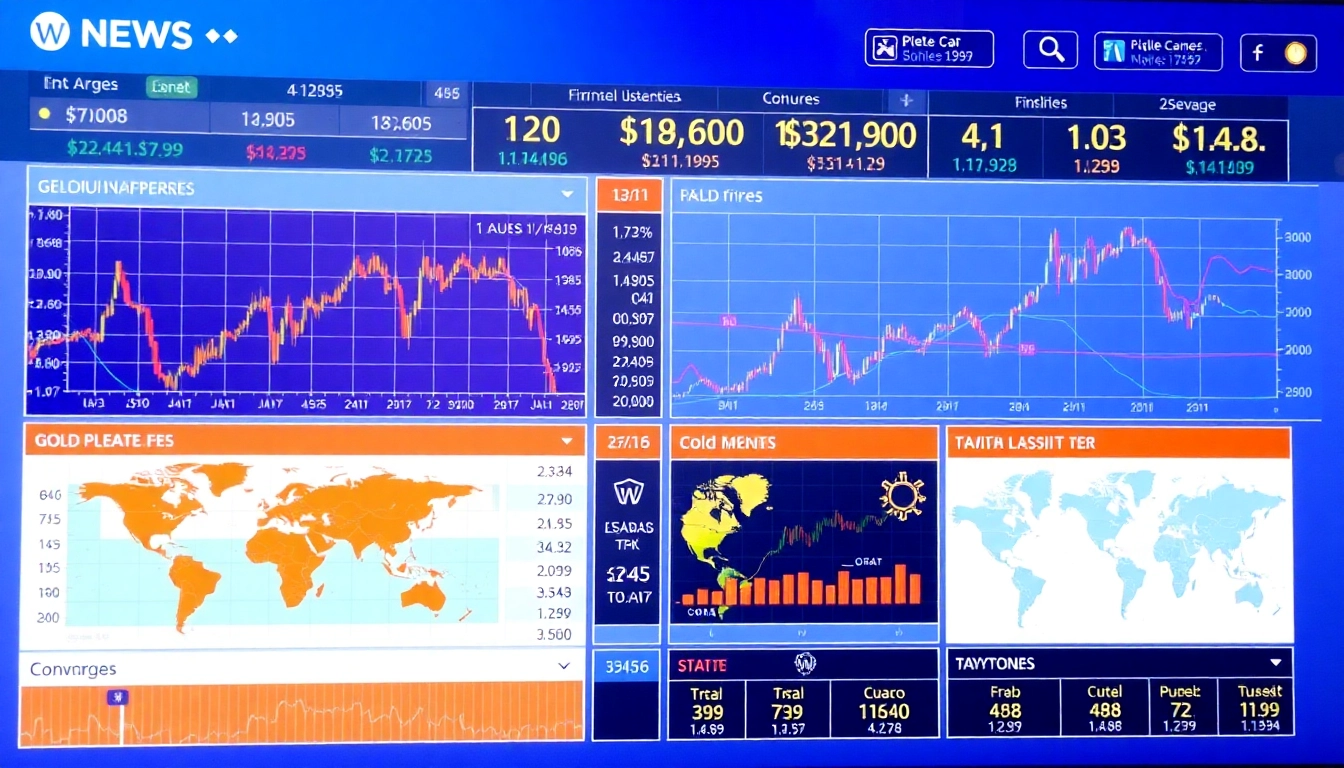Current Cryptocurrency Market Trends in the UK: An In-Depth Analysis
The UK cryptocurrency landscape is experiencing a dynamic phase marked by notable price movements, rising market volatility, and a growing interplay of global economic factors. Recent trends indicate a nuanced picture, where digital assets are increasingly influenced by macroeconomic developments, regulatory shifts, and technological advancements. As investors navigate this complex environment, understanding recent price trajectories and the tools available for market analysis is crucial. For those seeking timely insights, exploring Cryptocurrency News UK can provide valuable updates and expert commentary to inform decision-making.
Recent Price Movements and Market Volatility in UK Cryptocurrencies
Over recent months, UK cryptocurrencies like Bitcoin and Ethereum have demonstrated significant price swings. Bitcoin’s price, for instance, fluctuated between $50,000 and $60,000, driven by factors such as institutional adoption, investor sentiment, and geopolitical tensions. Besides, smaller altcoins experienced heightened volatility, sometimes surging by over 20% within hours, reflecting their susceptibility to market sentiment and speculative trading. This volatility underscores the importance of risk management strategies, such as setting stop-loss orders and diversifying holdings, to mitigate potential losses. Understanding the volatility patterns can help traders anticipate potential downturns and capitalize on upward moves, especially during breakout phases.
Impact of Global Events on UK Cryptocurrency Prices
Global macroeconomic events have profound effects on crypto valuations in the UK. For example, regulatory announcements from major economies, shifts in US dollar strength, or divergence in central bank policies influence investor confidence and liquidity. Recent fluctuations coincided with the US Federal Reserve’s hints at rate hikes, leading to a temporary dip in Bitcoin prices amid expectations of tightening monetary policy. Conversely, geopolitical tensions, such as conflicts or sanctions, often prompt safe-haven interest in cryptocurrencies, boosting prices. Therefore, keeping abreast of international events via credible sources is essential for UK investors aiming to anticipate possible market movements and adjust their strategies accordingly.
Analytical Tools for Tracking Cryptocurrency Price Movements
In today’s market, a variety of analytical tools empower investors to monitor and predict cryptocurrency trends effectively. Technical analysis platforms like TradingView and Coinigy offer real-time charting, pattern recognition, and customized indicators such as Moving Averages, RSI, and Bollinger Bands. Fundamental analysis tools, including on-chain data analytics (e.g., Glassnode, IntoTheBlock), provide insights into network activity, whale movements, and investor sentiment. Additionally, news aggregators and social media sentiment analysis help gauge market psychology. For UK investors, integrating these tools into a comprehensive analysis framework enables better timing of entry and exit points, reducing exposure to downside risk and enhancing potential returns.
Legal and Regulatory Developments Impacting Cryptocurrency News UK
Recent Regulatory Changes and Their Market Impacts
The regulatory landscape in the UK has undergone significant shifts, affecting market confidence and operational clarity for crypto entities. Recent measures include the Financial Conduct Authority’s (FCA) increased oversight on exchanges, including registration requirements and anti-money laundering (AML) compliance. Such developments aim to protect consumers but can also introduce short-term uncertainties, leading to market fluctuations. For example, stricter compliance requirements caused some platforms to suspend UK operations temporarily. Nonetheless, the long-term expectation is for a more transparent and secure environment, fostering institutional participation. Understanding these changes helps investors navigate compliance obligations and identify reputable platforms, thereby reducing exposure to fraud and regulatory risks.
Tax Policies and Compliance Tips for UK Investors
Taxation is a critical consideration for UK crypto investors. Recent policies stipulate that gains from crypto trading are subject to Capital Gains Tax (CGT), with specific thresholds and allowable deductions. The HM Revenue & Customs (HMRC) requires individuals to report crypto holdings and transactions, emphasizing the importance of accurate record-keeping. To optimize tax efficiency, investors should consider utilizing tax-free wrappers such as ISAs or innovative financing structures like EIS. Staying informed about ongoing policy updates ensures compliance and minimizes penalties. Seeking expert advice or employing specialized tax planning tools can maximize returns while adhering to regulations.
Future Legislative Trends in Cryptocurrency Legislation
The legislative horizon in the UK suggests a move towards more structured regulation and acceptance of digital assets. Proposals include creating a dedicated framework for crypto exchanges, clarifying the legal status of stablecoins, and exploring central bank digital currencies (CBDCs). Industry stakeholders advocate for balanced policies that promote innovation while ensuring investor protection. Anticipated developments include the potential implementation of licensing regimes for DeFi platforms and clearer rules on crypto advertising. Monitoring these trends helps traders and institutions prepare for a more regulated environment that could impact market liquidity, operational costs, and product offerings.
Investment Strategies and Opportunities in Cryptocurrency News UK
Top Cryptocurrencies to Watch in the UK Market
For investors seeking growth opportunities, Bitcoin remains the digital gold standard, serving as a store of value and hedge against inflation. Ethereum’s smart contract capabilities position it as a leader in decentralized applications and DeFi. Emerging altcoins like Cardano, Solana, and Avalanche are gaining traction due to their scalability and innovation. Monitoring these trends and technological developments can inform strategic allocations. Furthermore, niche assets such as utility tokens or tokens linked to specific sectors (e.g., gaming, NFTs) can diversify portfolios and exploit emerging trends.
Building a Diversified Cryptocurrency Portfolio
Diversification mitigates risk in volatile markets. A balanced approach involves holding a core position in blue-chip cryptos complemented by smaller, high-potential altcoins. Setting strategic allocation percentages based on risk appetite—e.g., 60% Bitcoin and Ethereum, 20% in promising altcoins, and 20% in stablecoins—can optimize risk-adjusted returns. Rebalancing periodically based on market conditions and news events ensures the portfolio adapts to evolving market dynamics. Utilizing dollar-cost averaging (DCA) mitigates timing risks by spreading investments over time, especially during highly volatile phases.
Risk Management and Security Tips for UK Cryptocurrency Traders
Secure management of digital assets is paramount. Employ hardware wallets like Ledger or Trezor for cold storage of significant holdings. Use two-factor authentication and strong, unique passwords for all accounts. Be wary of phishing schemes, fraudulent platforms, and social engineering attacks. Regularly update software and verify platform legitimacy through FCA registration checks. Additionally, stay informed about potential scams, such as pump-and-dump schemes common in lesser-known altcoins. Applying these security practices can prevent loss, fraud, and unauthorized access, ensuring your assets remain protected.
Role of Bitcoin and Altcoins in the UK Economy
Bitcoin’s Status as a Digital Gold in the UK
Bitcoin’s recognition as a store of value has increased in the UK, driven by its finite supply and decentralized nature. Institutional adoption, including corporate treasuries and pension funds exploring Bitcoin allocations, is gradually mainstreaming its status. Nevertheless, Bitcoin’s price remains sensitive to macroeconomic cues, regulatory developments, and technological innovations. Its resilience and increasing acceptance position it as a digital equivalent of gold, especially amid economic uncertainty.
Emerging Altcoins and Niche Market Opportunities
Altcoins like Solana, Terra, and Polkadot are gaining attention in the UK. These tokens offer solutions to scalability issues, interoperability, and specialized use cases. For example, decentralized finance (DeFi) and non-fungible tokens (NFTs) are expanding, creating new economic opportunities. Niche markets such as environmental tokens or social impact coins further diversify investment options, aligning with social responsibility trends and sustainability goals.
Economic Impacts of Cryptocurrency Adoption in the UK
Wide-scale adoption of cryptocurrencies could transform UK financial systems by reducing cross-border transaction costs, increasing financial inclusion, and fostering innovation. The emergence of blockchain-based applications may also enhance transparency and traceability in supply chains and government operations. However, challenges include regulatory hurdles, technology integration costs, and cybersecurity risks. Hence, policymakers and industry leaders must collaborate to harness crypto’s potential while addressing systemic vulnerabilities.
Future Outlook and Emerging Trends in Cryptocurrency News UK
Predictions for Cryptocurrency Price Trends in the UK
Market analysts project continued growth in institutional adoption, which could support Bitcoin’s role as a hedge and store of value. The advent of CBDCs in global economies, including pilot programs in the UK, could also influence crypto markets, potentially leading to increased legitimacy and use cases. Price volatility may persist but is expected to diminish as regulatory clarity improves and market infrastructure matures. Innovations like layer-2 solutions and interoperability protocols are expected to facilitate scalable transactions, boosting overall market stability and adoption.
Innovations and Technology Advancements Shaping the Market
Layer-2 scaling solutions such as Lightning Network (Bitcoin) and Optimistic Rollups (Ethereum) aim to address congestion and fees, making crypto transactions faster and cheaper. Decentralized finance (DeFi) continues to evolve, offering new avenues for lending, borrowing, and yield farming. Additionally, non-fungible tokens (NFTs) are gaining mainstream acceptance, opening opportunities in digital ownership and content monetization. Advances in security protocols, privacy features, and cross-chain interoperability will further shape the landscape, making cryptocurrencies more user-friendly and trustworthy.
Adapting to Regulatory Changes and Market Dynamics
Proactive adaptation to regulatory shifts, such as compliance with AML/KYC standards or licensing regimes, will be vital for sustained growth. Investors should stay informed through reputable news sources, industry forums, and official government publications. Diversifying across different asset classes within crypto, monitoring technological developments, and employing robust security measures will enable traders to navigate evolving market conditions successfully. Long-term strategic planning, combined with agility in response to regulatory and technological disruptions, will be key to capitalizing on future opportunities.









